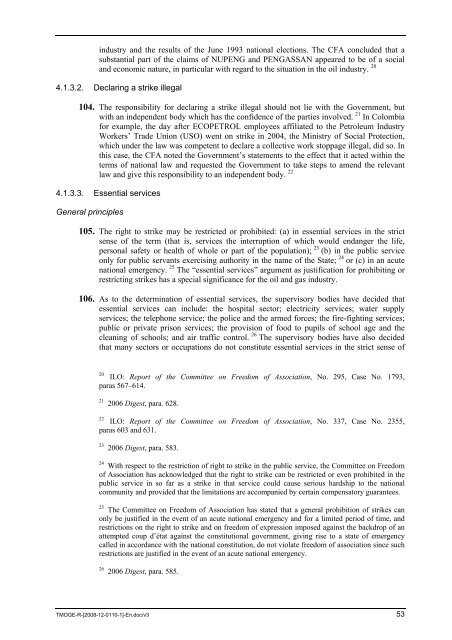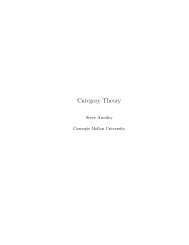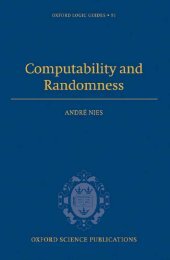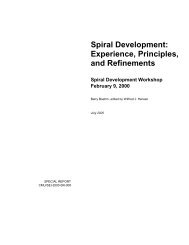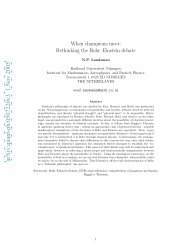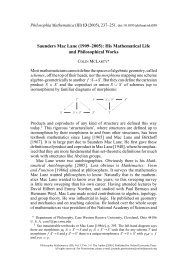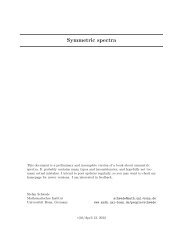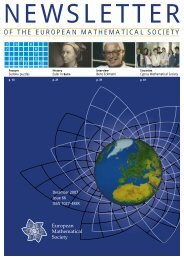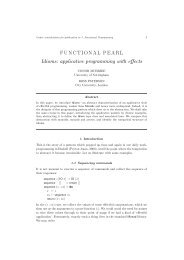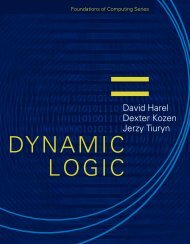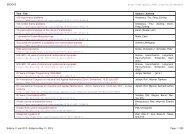wcms_161662
wcms_161662
wcms_161662
You also want an ePaper? Increase the reach of your titles
YUMPU automatically turns print PDFs into web optimized ePapers that Google loves.
industry and the results of the June 1993 national elections. The CFA concluded that a<br />
substantial part of the claims of NUPENG and PENGASSAN appeared to be of a social<br />
and economic nature, in particular with regard to the situation in the oil industry. 20<br />
4.1.3.2. Declaring a strike illegal<br />
104. The responsibility for declaring a strike illegal should not lie with the Government, but<br />
with an independent body which has the confidence of the parties involved. 21 In Colombia<br />
for example, the day after ECOPETROL employees affiliated to the Petroleum Industry<br />
Workers’ Trade Union (USO) went on strike in 2004, the Ministry of Social Protection,<br />
which under the law was competent to declare a collective work stoppage illegal, did so. In<br />
this case, the CFA noted the Government’s statements to the effect that it acted within the<br />
terms of national law and requested the Government to take steps to amend the relevant<br />
law and give this responsibility to an independent body. 22<br />
4.1.3.3. Essential services<br />
General principles<br />
105. The right to strike may be restricted or prohibited: (a) in essential services in the strict<br />
sense of the term (that is, services the interruption of which would endanger the life,<br />
personal safety or health of whole or part of the population); 23 (b) in the public service<br />
only for public servants exercising authority in the name of the State; 24 or (c) in an acute<br />
national emergency. 25 The “essential services” argument as justification for prohibiting or<br />
restricting strikes has a special significance for the oil and gas industry.<br />
106. As to the determination of essential services, the supervisory bodies have decided that<br />
essential services can include: the hospital sector; electricity services; water supply<br />
services; the telephone service; the police and the armed forces; the fire-fighting services;<br />
public or private prison services; the provision of food to pupils of school age and the<br />
cleaning of schools; and air traffic control. 26 The supervisory bodies have also decided<br />
that many sectors or occupations do not constitute essential services in the strict sense of<br />
20<br />
ILO: Report of the Committee on Freedom of Association, No. 295, Case No. 1793,<br />
paras 567–614.<br />
21 2006 Digest, para. 628.<br />
22<br />
ILO: Report of the Committee on Freedom of Association, No. 337, Case No. 2355,<br />
paras 603 and 631.<br />
23 2006 Digest, para. 583.<br />
24 With respect to the restriction of right to strike in the public service, the Committee on Freedom<br />
of Association has acknowledged that the right to strike can be restricted or even prohibited in the<br />
public service in so far as a strike in that service could cause serious hardship to the national<br />
community and provided that the limitations are accompanied by certain compensatory guarantees.<br />
25 The Committee on Freedom of Association has stated that a general prohibition of strikes can<br />
only be justified in the event of an acute national emergency and for a limited period of time, and<br />
restrictions on the right to strike and on freedom of expression imposed against the backdrop of an<br />
attempted coup d’état against the constitutional government, giving rise to a state of emergency<br />
called in accordance with the national constitution, do not violate freedom of association since such<br />
restrictions are justified in the event of an acute national emergency.<br />
26 2006 Digest, para. 585.<br />
TMOGE-R-[2008-12-0110-1]-En.doc/v3 53


